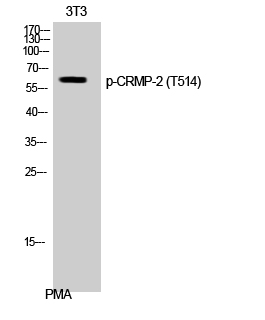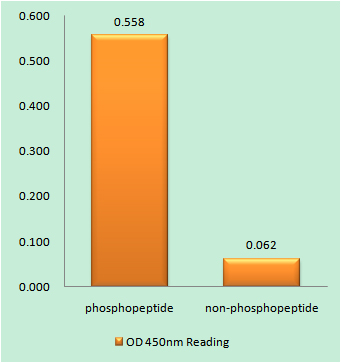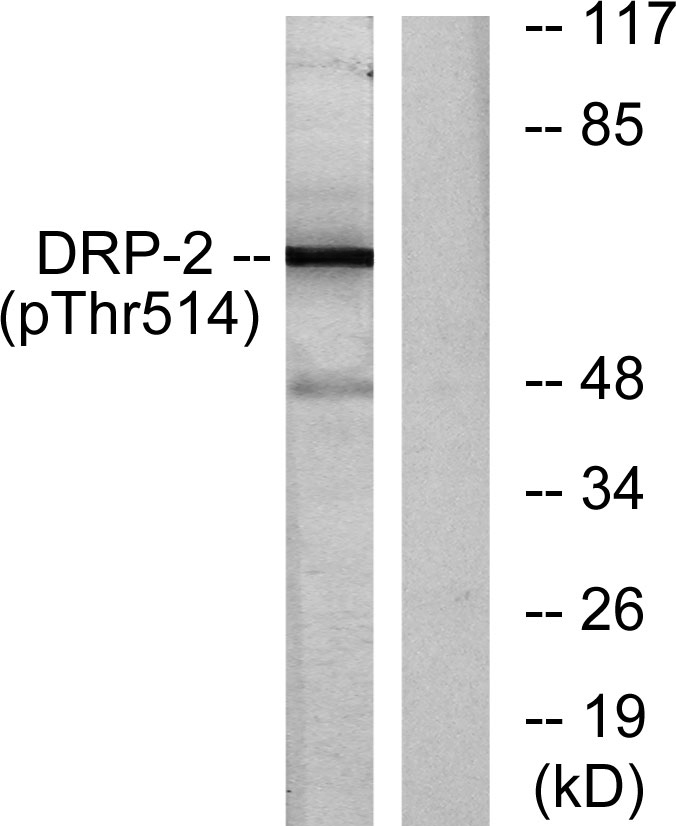CRMP-2 (phospho Thr514) Polyclonal Antibody
- Catalog No.:YP0947
- Applications:WB;IHC;IF;ELISA
- Reactivity:Human;Mouse;Rat
- Target:
- CRMP-2
- Fields:
- >>Axon guidance
- Gene Name:
- DPYSL2
- Protein Name:
- Dihydropyrimidinase-related protein 2
- Human Gene Id:
- 1808
- Human Swiss Prot No:
- Q16555
- Mouse Gene Id:
- 12934
- Mouse Swiss Prot No:
- O08553
- Rat Gene Id:
- 25416
- Rat Swiss Prot No:
- P47942
- Immunogen:
- The antiserum was produced against synthesized peptide derived from human DRP-2 around the phosphorylation site of Thr514. AA range:480-529
- Specificity:
- Phospho-CRMP-2 (T514) Polyclonal Antibody detects endogenous levels of CRMP-2 protein only when phosphorylated at T514.
- Formulation:
- Liquid in PBS containing 50% glycerol, 0.5% BSA and 0.02% sodium azide.
- Source:
- Polyclonal, Rabbit,IgG
- Dilution:
- WB 1:500 - 1:2000. IHC 1:100 - 1:300. IF 1:200 - 1:1000. ELISA: 1:5000. Not yet tested in other applications.
- Purification:
- The antibody was affinity-purified from rabbit antiserum by affinity-chromatography using epitope-specific immunogen.
- Concentration:
- 1 mg/ml
- Storage Stability:
- -15°C to -25°C/1 year(Do not lower than -25°C)
- Other Name:
- DPYSL2;CRMP2;ULIP2;Dihydropyrimidinase-related protein 2;DRP-2;Collapsin response mediator protein 2;CRMP-2;N2A3;Unc-33-like phosphoprotein 2;ULIP-2
- Observed Band(KD):
- 65kD
- Background:
- This gene encodes a member of the collapsin response mediator protein family. Collapsin response mediator proteins form homo- and hetero-tetramers and facilitate neuron guidance, growth and polarity. The encoded protein promotes microtubule assembly and is required for Sema3A-mediated growth cone collapse, and also plays a role in synaptic signaling through interactions with calcium channels. This gene has been implicated in multiple neurological disorders, and hyperphosphorylation of the encoded protein may play a key role in the development of Alzheimer's disease. Alternatively spliced transcript variants encoding multiple isoforms have been observed for this gene. [provided by RefSeq, Sep 2011],
- Function:
- function:Necessary for signaling by class 3 semaphorins and subsequent remodeling of the cytoskeleton. Plays a role in axon guidance, neuronal growth cone collapse and cell migration.,PTM:3F4, a monoclonal antibody which strongly stains neurofibrillary tangles in Alzheimer disease brains, specifically labels DPYSL2 when phosphorylated on Ser-518, Ser-522 and Thr-509.,similarity:Belongs to the DHOase family. Hydantoinase/dihydropyrimidinase subfamily.,subunit:Homotetramer, and heterotetramer with CRMP1, DPYSL3, DPYSL4 or DPYSL5 (By similarity). Interacts through its C-terminus with the C-terminus of CYFIP1/SRA1. Interacts with HTR4.,tissue specificity:Ubiquitous.,
- Subcellular Location:
- Cytoplasm, cytosol . Cytoplasm, cytoskeleton . Membrane . Tightly but non-covalently associated with membranes.
- Expression:
- Ubiquitous.
- June 19-2018
- WESTERN IMMUNOBLOTTING PROTOCOL
- June 19-2018
- IMMUNOHISTOCHEMISTRY-PARAFFIN PROTOCOL
- June 19-2018
- IMMUNOFLUORESCENCE PROTOCOL
- September 08-2020
- FLOW-CYTOMEYRT-PROTOCOL
- May 20-2022
- Cell-Based ELISA│解您多样本WB检测之困扰
- July 13-2018
- CELL-BASED-ELISA-PROTOCOL-FOR-ACETYL-PROTEIN
- July 13-2018
- CELL-BASED-ELISA-PROTOCOL-FOR-PHOSPHO-PROTEIN
- July 13-2018
- Antibody-FAQs
- Products Images

- Western Blot analysis of 3T3 cells using Phospho-CRMP-2 (T514) Polyclonal Antibody

- Enzyme-Linked Immunosorbent Assay (Phospho-ELISA) for Immunogen Phosphopeptide (Phospho-left) and Non-Phosphopeptide (Phospho-right), using DRP-2 (Phospho-Thr514) Antibody

- Immunofluorescence analysis of HeLa cells, using DRP-2 (Phospho-Thr514) Antibody. The picture on the right is blocked with the phospho peptide.

- Immunohistochemistry analysis of paraffin-embedded human brain, using DRP-2 (Phospho-Thr514) Antibody. The picture on the right is blocked with the phospho peptide.

- Western blot analysis of lysates from NIH/3T3 cells treated with PMA 125ng/ml 30', using DRP-2 (Phospho-Thr514) Antibody. The lane on the right is blocked with the phospho peptide.



